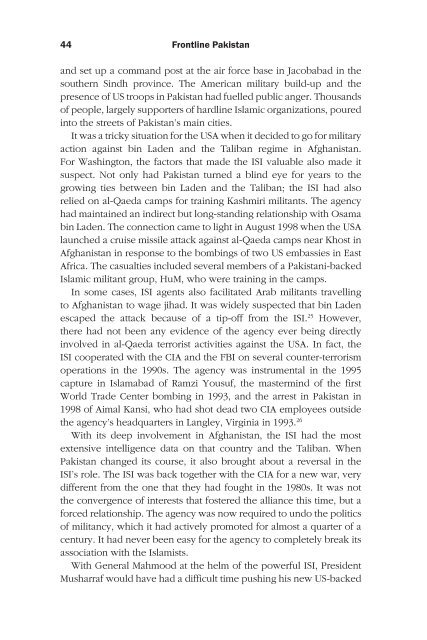Frontline Pakistan : The Struggle With Militant Islam - Arz-e-Pak
Frontline Pakistan : The Struggle With Militant Islam - Arz-e-Pak
Frontline Pakistan : The Struggle With Militant Islam - Arz-e-Pak
You also want an ePaper? Increase the reach of your titles
YUMPU automatically turns print PDFs into web optimized ePapers that Google loves.
<strong>Frontline</strong> <strong><strong>Pak</strong>istan</strong><br />
and set up a command post at the air force base in Jacobabad in the<br />
southern Sindh province. <strong>The</strong> American military build-up and the<br />
presence of US troops in <strong><strong>Pak</strong>istan</strong> had fuelled public anger. Thousands<br />
of people, largely supporters of hardline <strong>Islam</strong>ic organizations, poured<br />
into the streets of <strong><strong>Pak</strong>istan</strong>’s main cities.<br />
It was a tricky situation for the USA when it decided to go for military<br />
action against bin Laden and the Taliban regime in Afghanistan.<br />
For Washington, the factors that made the ISI valuable also made it<br />
suspect. Not only had <strong><strong>Pak</strong>istan</strong> turned a blind eye for years to the<br />
growing ties between bin Laden and the Taliban; the ISI had also<br />
relied on al-Qaeda camps for training Kashmiri militants. <strong>The</strong> agency<br />
had maintained an indirect but long-standing relationship with Osama<br />
bin Laden. <strong>The</strong> connection came to light in August 1998 when the USA<br />
launched a cruise missile attack against al-Qaeda camps near Khost in<br />
Afghanistan in response to the bombings of two US embassies in East<br />
Africa. <strong>The</strong> casualties included several members of a <strong><strong>Pak</strong>istan</strong>i-backed<br />
<strong>Islam</strong>ic militant group, HuM, who were training in the camps.<br />
In some cases, ISI agents also facilitated Arab militants travelling<br />
to Afghanistan to wage jihad. It was widely suspected that bin Laden<br />
escaped the attack because of a tip-off from the ISI. 25 However,<br />
there had not been any evidence of the agency ever being directly<br />
involved in al-Qaeda terrorist activities against the USA. In fact, the<br />
ISI cooperated with the CIA and the FBI on several counter-terrorism<br />
operations in the 1990s. <strong>The</strong> agency was instrumental in the 1995<br />
capture in <strong>Islam</strong>abad of Ramzi Yousuf, the mastermind of the first<br />
World Trade Center bombing in 1993, and the arrest in <strong><strong>Pak</strong>istan</strong> in<br />
1998 of Aimal Kansi, who had shot dead two CIA employees outside<br />
the agency’s headquarters in Langley, Virginia in 1993. 26<br />
<strong>With</strong> its deep involvement in Afghanistan, the ISI had the most<br />
extensive intelligence data on that country and the Taliban. When<br />
<strong><strong>Pak</strong>istan</strong> changed its course, it also brought about a reversal in the<br />
ISI’s role. <strong>The</strong> ISI was back together with the CIA for a new war, very<br />
different from the one that they had fought in the 1980s. It was not<br />
the convergence of interests that fostered the alliance this time, but a<br />
forced relationship. <strong>The</strong> agency was now required to undo the politics<br />
of militancy, which it had actively promoted for almost a quarter of a<br />
century. It had never been easy for the agency to completely break its<br />
association with the <strong>Islam</strong>ists.<br />
<strong>With</strong> General Mahmood at the helm of the powerful ISI, President<br />
Musharraf would have had a difficult time pushing his new US-backed













